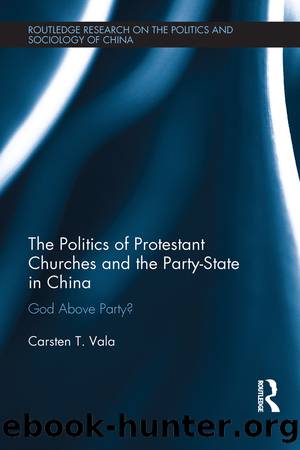The Politics of Protestant Churches and the Party-State in China: God Above Party? by Carsten T Vala

Author:Carsten T Vala [Vala, Carsten T]
Language: eng
Format: epub
Tags: Ethnic Studies, Religion, Social Science, Political Science, World, Asian, Christianity, General, Regional Studies
ISBN: 9781351712668
Google: Rlc0DwAAQBAJ
Goodreads: 36706126
Publisher: Routledge
Published: 2017-09-06T00:00:00+00:00
Small group closure builds social capital in frequent, intimate, open gatherings
If Protestant church leaders only preached and modeled particular values as behavioral norms, their teachings might inspire followers but would not hold them accountable. Behavioral change however occurs most effectively when positive sanctions to encourage behavioral change are paired with negative ones that sanction misbehavior. In short, âcarrotsâ work best with âsticks.â This means that social capital accumulates best when regular feedback solidifies norms through approval and disapproval, and this feedback flows best when the social network is small enough to allow closure, a characteristic in which all participants know and interact with each other (Coleman 1990). Hence, a second set of factors that build social capital is small-scale settings, frequent restatement of norms, and open communication.
Most unregistered Protestant gatherings started small to prevent the state from discovering and disrupting them. As they grew larger, unregistered congregations from the 1980s (and earlier) through the 2000s typically divided into cellular groups, which led to small groups becoming a distinguishing trait of the majority of unregistered churches. Unregistered church leaders and participants in many areas of the country described small groups as ubiquitous (Interviews, Dalian, November 2003; Harbin, October 2003). Some Protestants in the early 2000s cited the scattered nature of small meetings as key to maintaining security, even when successful recruitment led to larger and larger meetings. In Harbin, a leader of more than twenty years explained that when her church had grown to one thousand believers she decided it should no longer meet in a rented restaurant room, in part to reduce security concerns.7 She decided to divide it into groups of fewer than two-dozen Protestants each.
Smaller gatherings attract less regime attention and thereby reduce the chance of discovery, and leaders in cities can also more easily accommodate small groups in the cramped confines of urban apartments. But more importantly, in earlier years, because leaders worried that regime agents may infiltrate their meetings, explained a Beijing leader in 2003, gatherings of a few people also limited the exposure of the entire church to potential betrayal. Inviting newcomers to small groups first provided a mechanism by which church leaders could vet interested people to learn whether they earnestly sought Christian fellowship or faked enthusiasm in order to gain entry and report illegal congregations to the regime (Interview, Beijing, August 2003). One Beijing unregistered church leader organized his congregation into small groups of five to six people, intimate prayer meetings that provide the first entrée for inquirers (Interview, Beijing, August 2003). Once inquirers evinced evidence that their faith had changed their behavior, they were invited to bible study groups and eventually to large-scale Sunday services. Worship times also alternated between early morning, noontime, and evening to avoid detection. When Sunday gatherings dispersed, congregants left the worship in twos without speaking to one another (Interview, Beijing, August 2003). By the mid-2010s, however, few Beijing unregistered congregations continued to take such extreme security measures.8
Part of the shift in church precautions from the early 2000s to the mid-2010s had to do with the improved surveillance of local authorities.
Download
This site does not store any files on its server. We only index and link to content provided by other sites. Please contact the content providers to delete copyright contents if any and email us, we'll remove relevant links or contents immediately.
The Secret History by Donna Tartt(19060)
The Social Justice Warrior Handbook by Lisa De Pasquale(12187)
Thirteen Reasons Why by Jay Asher(8895)
This Is How You Lose Her by Junot Diaz(6877)
Weapons of Math Destruction by Cathy O'Neil(6267)
Zero to One by Peter Thiel(5789)
Beartown by Fredrik Backman(5738)
The Myth of the Strong Leader by Archie Brown(5501)
The Fire Next Time by James Baldwin(5432)
How Democracies Die by Steven Levitsky & Daniel Ziblatt(5216)
Promise Me, Dad by Joe Biden(5146)
Stone's Rules by Roger Stone(5081)
A Higher Loyalty: Truth, Lies, and Leadership by James Comey(4955)
100 Deadly Skills by Clint Emerson(4921)
Rise and Kill First by Ronen Bergman(4780)
Secrecy World by Jake Bernstein(4743)
The David Icke Guide to the Global Conspiracy (and how to end it) by David Icke(4709)
The Farm by Tom Rob Smith(4502)
The Doomsday Machine by Daniel Ellsberg(4485)
